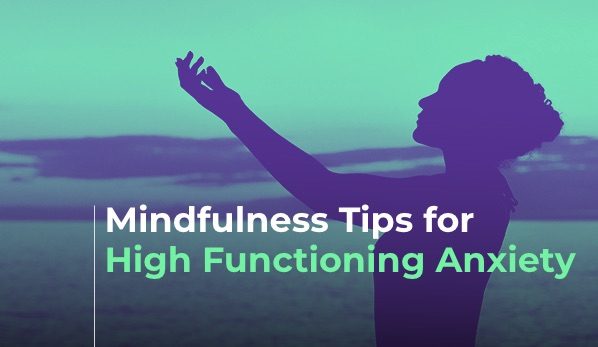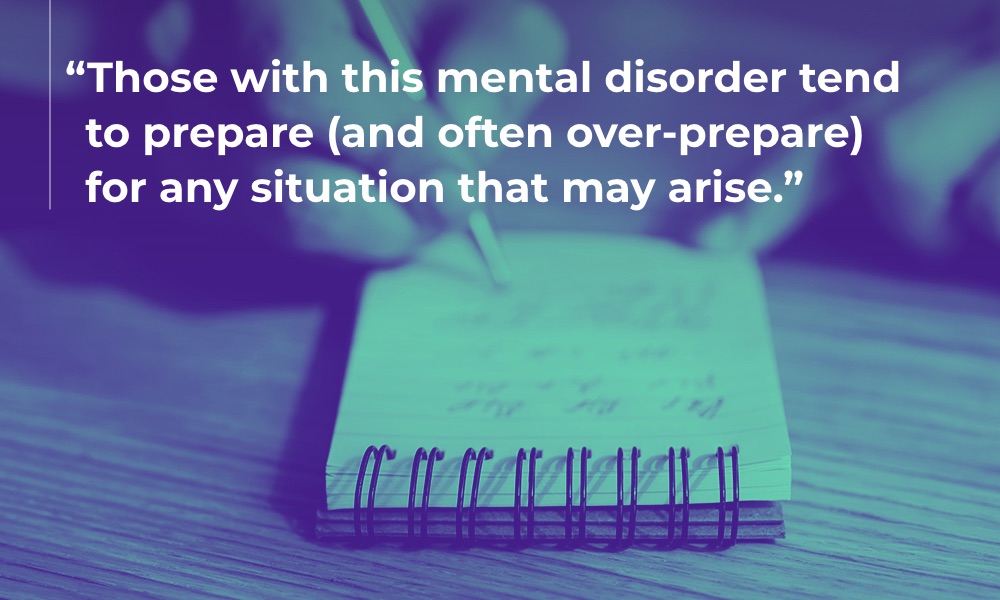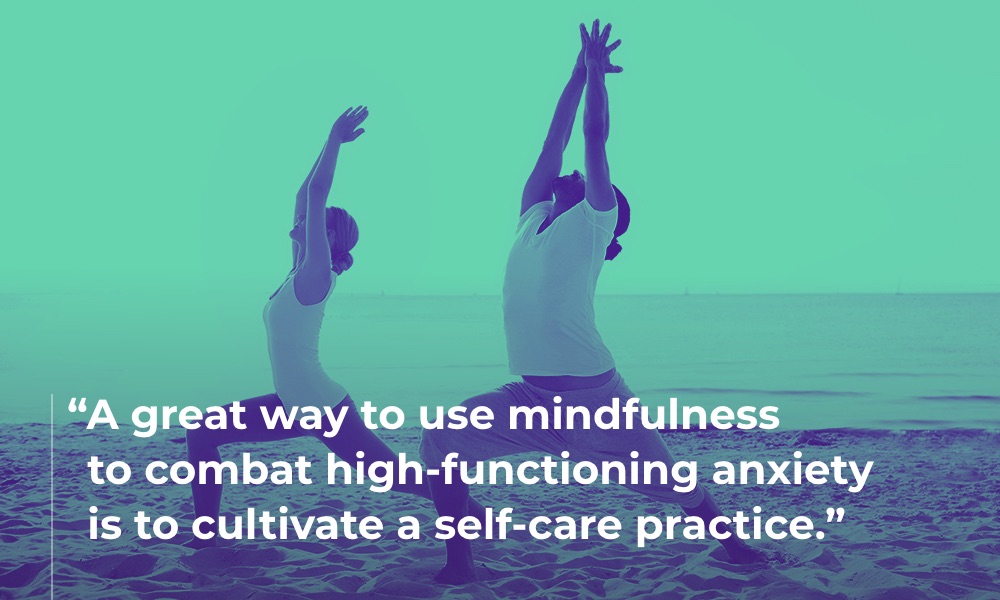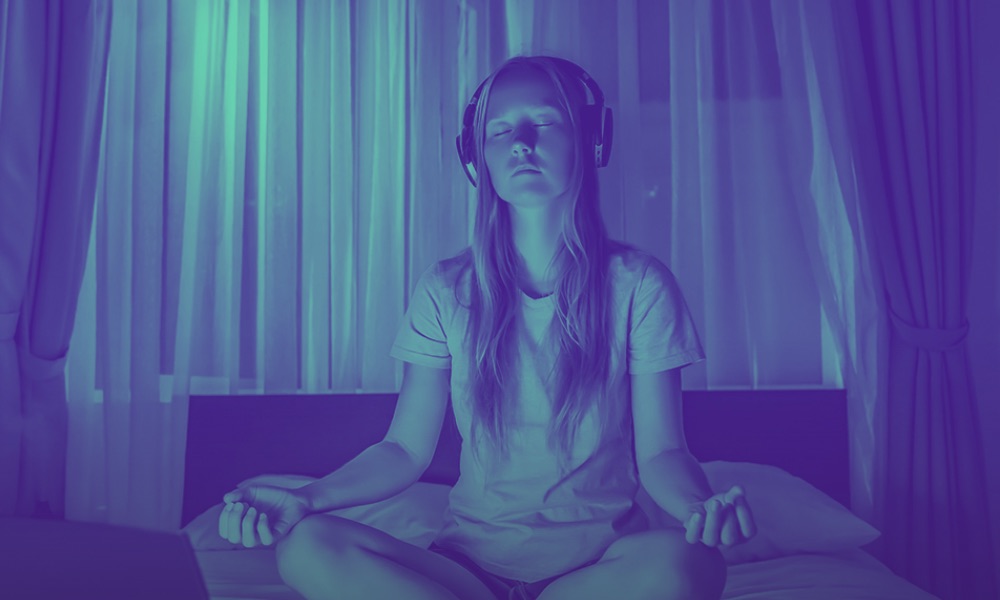Individuals who have high-functioning anxiety are organized, high-achieving, and productive. To outsiders, it appears as if their lives are completely put together. But on the inside, they experience the typical symptoms of an anxiety disorder, such as racing thoughts, excessive worry, panic attacks, nervous habits, and chest pain.
Thankfully, mindfulness habits can help reduce the symptoms of high-functioning anxiety.
In this article, we explore what high-functioning anxiety is, including what can cause it and symptoms to look out for. We also share some of the best mindfulness tips for coping with high-functioning anxiety. Plus, we offer one way to get started with mindfulness today for free. Let’s jump in!
What is High Functioning Anxiety?
People with this high functioning anxiety experience the symptoms of anxiety, but to outsiders, it often appears as though they don’t. In fact, those who have high functioning anxiety tend to be very successful high-achievers. They may even be more accomplished than their peers who don’t have anxiety. This is because high functioning anxiety creates fears about falling behind or being perceived as inadequate, and this fear propels people who have it forward at the cost of their mental health.
People with high functioning anxiety are often labeled as perfectionists, overachievers, or type A personalities. But despite their successes, they privately experience anxiety symptoms, like a sense of impending doom, racing thoughts, or a pounding heart rate. Those with high-functioning anxiety may also be prone to insomnia, restlessness, and trouble breathing.
High-functioning anxiety can be harder to get help for than other conditions. Because people with high functioning anxiety appear to function well in society, others assume they aren’t struggling. This can make loved ones less likely to offer support. Without support, it becomes even more difficult for people to seek help.
Symptoms of High Functioning Anxiety
Those with high-functioning anxiety will likely experience many of the same symptoms as people with other types of anxiety, like generalized anxiety disorder. This includes physical symptoms we mentioned above, like a pounding heart rate and a sense of impending doom. However, some symptoms are unique to those with high-functioning anxiety.
A person with high-functioning anxiety may:
- Over-prepare. Those with this mental disorder tend to prepare (and often over-prepare) for any situation that may arise. They likely plan several steps ahead in work, school, and their personal lives. Often, they do this to reduce the chance of something going wrong.
- Be a people-pleaser. Typically, people with high-functioning anxiety are very invested in pleasing others. This can lead to extreme agreeableness and a difficult time saying no. High-functioning anxiety sufferers say yes even when it’s detrimental to their own health and happiness. This happens because they feel that satisfying others’ expectations is most important.
- Procrastinate. Procrastination is another symptom of high-functioning anxiety. People with high-functioning anxiety may procrastinate on their work due to a conscious or unconscious fear of doing it incorrectly. This leads them to rush to finish the work successfully by the deadline.
- Compare themselves to others. People with this mental disorder may engage in a lot of social comparison with their peers. Additionally, they may experience more overthinking and negative self-talk than those who don’t have anxiety.
- Be extremely hardworking. Generally, a person with high-functioning anxiety will prioritize their outward success over their own internal happiness. For this reason, they tend to neglect self-care practices like taking ample time to relax.
- Be a perfectionist. People with high-functioning anxiety tend to have an extreme fear of failure. This can lead to perfectionism and cause dissatisfaction with themselves and their work, no matter how successful they may be.
- Have additional anxiety disorders. High-functioning anxiety may be comorbid with other anxiety disorders, such as an eating disorder, substance use disorder, panic disorder, phobia anxiety disorder, or social anxiety disorder.
What Causes High Functioning Anxiety?
Often, the causes of high-functioning anxiety are not attributable to just one thing. There is a combination of factors that can contribute to this disorder.
If you think you have high functioning anxiety, talk to a qualified mental health professional. They can help diagnose your disorder and help you decide which physical, nutritional, and lifestyle factors may be contributing to your unease. Here are just a few of the factors that may lead to high-functioning anxiety.
Physical Health Factors
- A serotonin imbalance
- Certain illnesses, like IBS, thyroid issues, or chronic pain
- Genetic inheritance
Lifestyle Factors
- Too much stress
- Conditions like post-traumatic stress disorder (PTSD)
- Childhood trauma
- Poor self-care habits, like too little exercise, too much exercise, or substance abuse
- Negative thinking patterns
- Poor sleep habits
- Not making time for leisure activities
Nutritional Factors
- Overconsumption of processed foods and refined sugar
- Overconsumption of alcohol and/or caffeine
- Eating too little or not enough
- Food allergies or intolerances
- Not drinking enough water
Coping with High Functioning Anxiety using Mindfulness
Do you think you have high-functioning anxiety? Have you been diagnosed with this anxiety disorder? If so, it’s important to know you’re not alone.
In fact, nearly 20% of U.S. adults have an anxiety disorder. It’s also important not to panic or lose hope. There are many treatment options for coping with your anxiety and living a happy, fulfilling life.
Anxiety treatments include psychiatry, psychotherapy, cognitive behavioral therapy (CBT), hypnotherapy, anti-anxiety medication, and antidepressants (SSRIs).
One of the best (and easiest!) ways to reduce your anxiety is to practice mindfulness. Mindfulness is the art of bringing all of your attention to the present moment. It’s an excellent way to reduce the symptoms of high-functioning anxiety and improve your overall well-being.
A great way to use mindfulness to combat high-functioning anxiety is to cultivate a self-care practice. This doesn’t have to be elaborate or costly. In many cases, mindfully practicing self-care is free. Here’s how you do it: simply pause, breathe, and then tune in to what your body is asking of you.
This may include eating frequent, balanced meals, limiting alcohol and caffeine, exercising regularly in a way that you enjoy, and getting sufficient sleep. It may also include getting outside as often as possible, getting ample sunshine (while wearing sunscreen!), and limiting your screen time. Next time you’re feeling anxious, tune in to your body and see what it’s asking for.
Another way to practice mindfulness for your anxiety is to spend time with friends and family consciously. When you’re with your loved ones, try turning off your phone and actively listening to every word they say. When you’re fully engaged in the moment with your people, you don’t have the mental capacity to think about what’s worrying you. This gives your nervous system a much-needed break, and it helps rewire your brain to be more present.
Another excellent way to use mindfulness to treat high-functioning anxiety is to be intentional with how you spend your time. This may look like consciously putting limits on how much work you do in a day. Or it may include setting aside time each week for something that’s enjoyable but not “productive.” Or it could be setting boundaries with others to ensure you take time for yourself.
Finally, you can use mindfulness for your anxiety by cultivating a meditation practice. A regular mindfulness meditation routine is linked to dozens of benefits, like reducing anxiety and stress. Plus, over time, meditation can help you change how your brain and nervous system respond to stressful situations. This will ensure that you’re not fueling your anxiety further.
A meditation practice doesn’t have to be complicated or long. Even just one minute of daily meditation is far better than none. Plus, there are tons of resources that can help guide you through the meditation process to help make it approachable and engaging.
Using Primed Mind to Combat High Functioning Anxiety
If you suffer with mental health issues, you’re not alone. But high-functioning anxiety doesn’t have to destroy your quality of life. And mindfulness tools like meditation can make it a lot easier to manage.
Primed Mind is a meditation app created by one of the world’s leading mindset coaches that brings the power of guided meditation to your home without the cost or commute of going to a guided meditation class.
Easy to incorporate into your wellness routine, Primed Mind’s meditations range from 5 to 20 minutes, and there are new meditation sessions added every month. You can meditate on a variety of topics, with primers like “Reduce Your Anxiety,” “Overcome Your Insecurities,” and “Learn From Failure.”
Primed Mind is free to download, so you can start overcoming your high-functioning anxiety and invest in bettering your mental health today!




